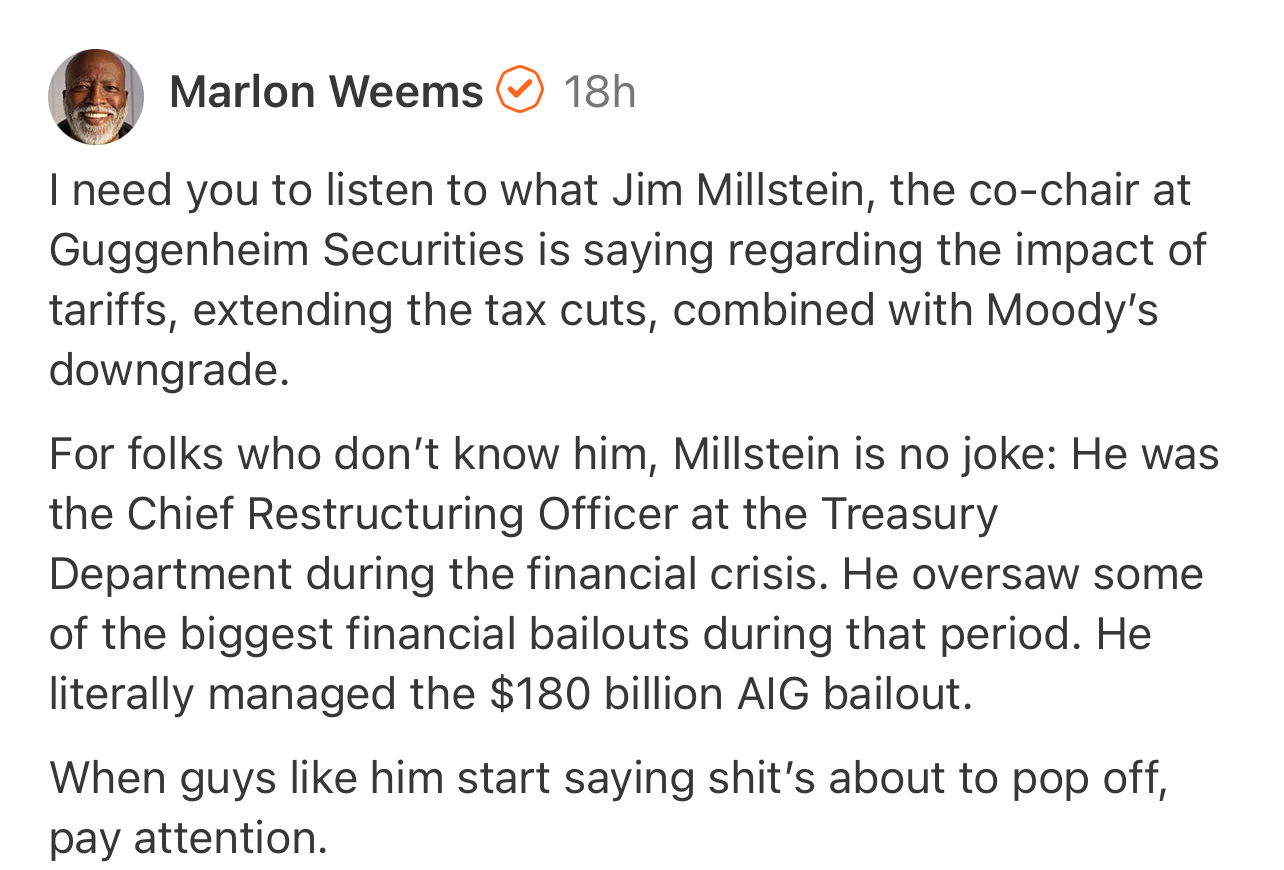This morning, a follower posed a few questions about a clip from Bloomberg Television featuring Guggenheim Securities Co-CEO Jim Millstein I posted yesterday on the Substack app. I thought some of you might be interested in my somewhat lengthy response.
Before I get into the Q&A, I’d like to point out that what follows is essentially the kind of bespoke note I might send to a trading client who wanted to understand the lay of the land before the market opened. Depending on the client, I might follow up with a call to walk them through the details. It’s the kind of tailored analysis that resulted in business. Here's my comment and the clip that led to the question. If you’re interested, here’s a link to the full video, which lasts about ten minutes.
The Journeyman's written content is available without paywalls. To support free and independent journalism, please consider becoming a paid subscriber.
This is the series of questions I was asked this morning about my comments above, followed by my response. I edited it slightly for this post to provide additional context. and added a few links:
I would categorize the events in the screenshot as “Black Swan” events. In my opinion, we could experience a considerable amount of economic pain before anything like the financial crisis occurs. My suspicion (and I believe Millstein suggests this in the clip) is that neither Congress nor the stock market seems to understand the reality or the potential impact of what’s right around the corner, specifically:
The impact of a massive tax cut, funded by eliminating healthcare and food relief for millions, achieved by adding trillions to the deficit. Aside from the human costs, should this bill pass, we’re talking hospital closures in rural communities, due to loss of funding, which also means lots of job losses, bankruptcies, etc.
So far, the market has shrugged off the ratings downgrade by Moody’s, but it will almost certainly lead to higher borrowing costs, which will increase the deficit. Keep in mind, this has happened as Congress is attempting to pass a bill that could add trillions to the deficit in the best-case scenario, and it has yet to address the debt ceiling. I haven’t seen anyone in the media press Republicans on how the plans make even the slightest bit of economic sense.
We still have no idea where we’ll end up on tariffs, but even if Trump backed off to pre-Liberation Day levels, it almost doesn’t matter now. Businesses, even those unaffected by tariffs, have already begun to raise prices, due to the uncertainty of what may happen, and because that’s how capitalism works. Trump can scream at the Fed all he wants, but cutting rates in an inflationary environment is next to impossible. [Additional context on potential for tariff-related price gouging from The New York Times]
Something else that hasn’t received a lot of attention is the fact that the government is set to ramp up student loan collections on the 5.3 million borrowers currently in default. So, on top of everything previously mentioned, millions are about to have one more bill to pay. I don’t think it’s a stretch to assume that many won’t be able to afford this, which means a massive hit to credit scores, possibly loan defaults, and more bankruptcies.
Any one of these factors could lead to economic stagnation. Should all or a combination of them occur, it could take us over the edge. The problem we’re faced with is that we have a supremely incompetent person guiding the country. Worse, he’s surrounded by sycophants, incompetents, and grifters. Since they’re in the minority, Democrats have few tools at their disposal, but with a few exceptions, they seem unwilling to use them. So there’s that.
I know this is a grim assessment, but it’s where we find ourselves. ~MSW







Thank you for your honest assessment. We are in a mess.
I appreciate your perspective Marlon and look forward to each newsletter. Very unsettling and the amount stress this will add to folks life is reprehensible.